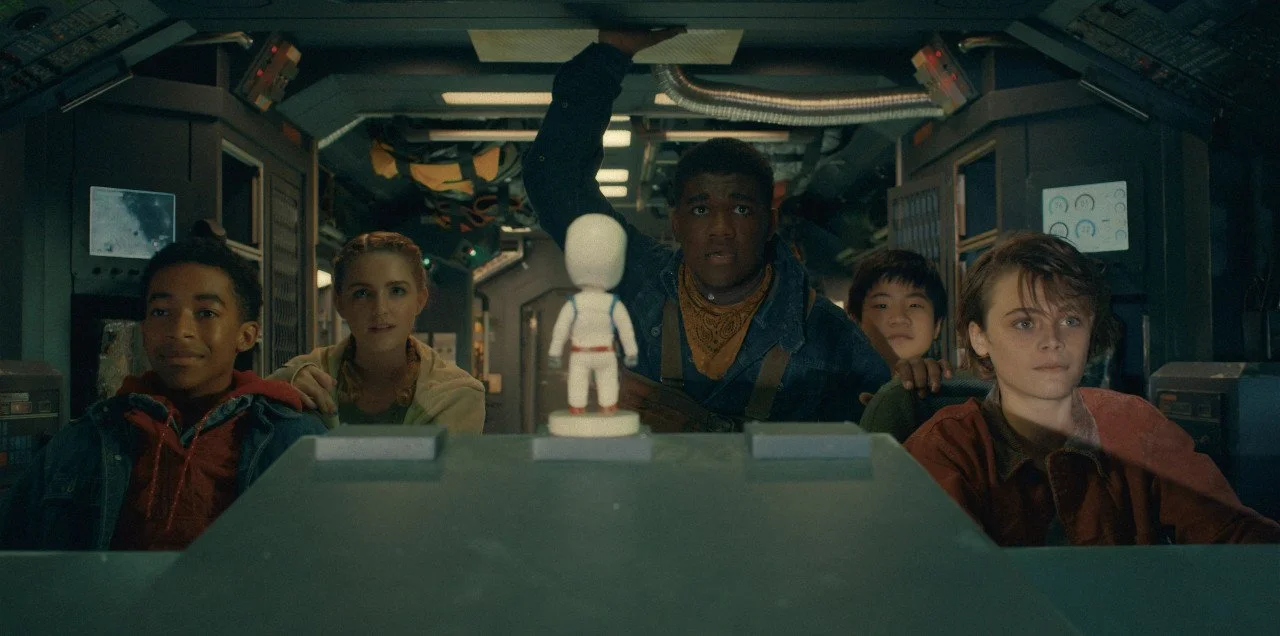Crater: Kinda like Stand by Me but Nicer… and Set in Space
By John Kirk
Rating: B+
The most memorable line in Stand by Me is Richard Dreyfuss’ last one: “I never had any friends later on like the ones I had when I was 12. Jesus, does anyone?”
That same nostalgic sense of friendship is what Crater tries to capture and export to a science-fiction setting. And despite its Disney packaging (ie: no profanity, no sex or violence), it mostly succeeds.
Director Kyle Patrick Alvarez and screenwriter John Griffin’s Crater is a sweet story about friendship lasting a lifetime but set in the year 2257. Kinda like Stand by Me, but nicer… and in space.
We meet Caleb (Isaiah Russell-Bailey) whose father (Scott Mescudi) has recently died in a tragic accident. One of the benefits he has left his son is passage to a paradisical colony planet called Omega, the much-desired ambition of all the contracted labourers on the Moon.
However, it will take 75 light years to travel there, and this means that Caleb must leave his friends behind, forever. In order to help him keep a promise to his father, his friends help him steal a moon rover for a trip to a mysterious crater his father wanted him to see; one last adventure before Caleb leaves for the Omega Colony.
In production notes, Alvarez readily admits the obvious influence of Stand by Me but without leeches, lard-asses, and two-bit dime store hoods. It lacks the grittiness of growing up in Rob Reiner’s stylized coming-of-age story that featured violence, bullying, abuse, and other realistic elements of adolescence.
In Crater, there are significant issues as well, like economic disparity, authoritarian government policies, an ignorant workforce, and the instability of the family, but these seem less realistic in comparison. In fact, they seem more like social commentaries than reflections of the dynamics of adolescent friendship.
However, there’s no discounting the commitment to each other in the relationships of the characters. Caleb’s best friends Dylan (Billy Barratt), Borney (sic, played by Orson Hong) and Marcus (Thomas Boyce) are willing to drop everything to facilitate their friend’s promise to his dad. It’s the chance for one big, last adventure and to build memories which will never go away.
In this way the story does replicate the loyalty in Stand by Me and as they violate assumed mining colony safety protocols, steal a moon rover that isn’t their property and defy certain death by going out on to the lunar surface when there’s a meteorite shower supposed to happen, the audience understands the level of importance this trip has to them all.
Enlisting the help of the well-connected recent Earth arrival, Addison (McKenna Grace) whose father happens to have the access codes to leave the mining facility, even new friendships are formed. The adventure brings them all together in a way that allows them to make the memories they want to generate.
The same spirit of rebellion is present in Crater as well. In that, kids in the 2200s are just as likely to break rules and challenge authority as kids in the 1950s. But in Crater, we see less of the authority figures. What we do see is evidence of the authority in the forms of discarded plans for construction on the Moon to improve life and a social system of indentured servitude. In short, like the adventurers in Stand by Me, the kids in this film are standing against the authority in the coming-of-age ways that we would expect them to.
There’s destruction of property and of course, personal risk to their own safety in both films, but the Crater kids appear to be more sophisticated and expressive in their appreciation of what’s wrong with their society. In Stand by Me, kids learn just by being kids.
Maybe it’s a generational perception.
Still, kids — particularly rebellious ones who get into trouble —swear. They curse and hit things and act out in less controlled and generally rude and crude ways. The absence of crudeness and profanity, while potentially well-received by some audience members, is glaringly unrealistic.
It reminds us that this is definitely a Disney film and contributes to a lack of authenticity. If there would be a criticism of the film, it’s how antiseptic their relationships seem. Even when they’re angry with each other, they quickly resolve their differences and even apologize.
Despite their lack of formal education, repressive government, and status as indentured serfs, they somehow still know how to use their words and not their fists. The fact that they don’t act out like this is a little hard to accept. It’s a dimension of the suspension of disbelief that should be reserved for the science fiction elements of the story instead of the human ones.
The overpowering amount of sentimentality in the film manages to make up for the absence of this credibility. The cast does an excellent job of convincing us of their bond with each other while not overdoing it. The way the friendships in this film are portrayed are wholesomely good in nature, and as Richard Dreyfuss’ character in Stand by Me reminds us, remembering these friendships are good and we look back fondly on them. We’ll never see them again, but they’ll always stay with us.
In an interview with NPR about his time in Stand by Me, actor Wil Wheaton recalled that “it’s a time that stays with us for the rest of our lives.” That pretty much sums up the ambition of the film when you remember that Caleb will be asleep for a 75-year trip to another solar system.
Nevertheless, it’s a still a sweet-spirited, beautiful family film. It manages to evoke a great deal of empathy for Caleb, his friends, and the callback to a genuine friendship we could all remember when we were young.
No one ever has a friendship like that again but their memories still stay with us. You know, like the light we see from a star millions of light years away? That’s in the movie. See what I mean?
Crater. Directed by Kyle Patrick Alvarez. Written by John Griffin. Starring Isaiah Russell-Bailey, Billy Barratt, Orson Hong, Thomas Boyce, McKenna Grace, and Scott “Kid Cudi” Mescudi. Debuts on Disney+ May 12.



